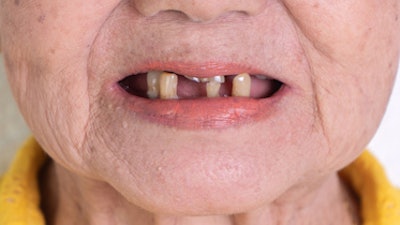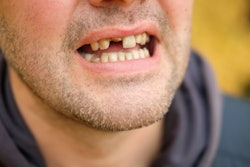
People who have both diabetes and tooth loss are at risk of a worse and faster cognitive decline as they age, according to a study published on March 12 in the Journal of Dental Research.
The findings highlight the importance for older adults to manage their diabetes and get regular dental care, noted a team led by Bei Wu, PhD, of New York University (NYU) in New York City. Wu is the vice dean of research at NYU's Rory Meyers College of Nursing and co-director of the university's aging incubator.
"Our findings underscore the importance of dental care and diabetes management for older adults in reducing the devastating personal and societal costs of Alzheimer's disease and other related dementias," Wu said in a statement released by NYU.
Diabetes is associated with cognitive decline and dementia, as high blood sugar, insulin resistance, inflammation, and heart disease are believed to prompt changes in the brain. Research has also shown a similar connection between poor oral health, such as gum disease and tooth loss, and cognitive impairment, the researchers noted, in part because of the inflammation caused by these conditions. In addition, nutritional deficiencies exacerbated by impaired glucose tolerance and insulin sensitivity may contribute to cognitive impairment.
Wu's group analyzed 12 years of data (2006 to 2018) from the University of Michigan's Health and Retirement Study to assess cognitive changes over time in 9,948 adults grouped by age (65 to 74, 75 to 84, and 85 and older). The study tracked participants' memory and cognitive function every two years, along with tooth loss, diabetes, and other health and demographic factors. Wu's team particularly focused on those in the cohort who had lost all their teeth.
The study found the following:
- Adults between the ages of 65 to 84 who had both diabetes and complete tooth loss demonstrated worse cognitive function than their counterparts without either condition.
- Adults between the ages of 65 to 74 with diabetes alone experienced accelerated cognitive decline.
- Adults between the ages of 65 to 84 without any teeth experienced accelerated cognitive decline, but older adults age 65 to 74 with both diabetes and complete edentulism had the fastest rate.
The study results suggest that older adults with both poor health and diabetes should have regular dental visits and adhere to diabetes treatment, according to Wu and colleagues.
"Access to dental care for older adults -- especially those with diabetes -- is critical, and health care providers should educate their patients about the connection between oral health and cognition," said Wu.



















